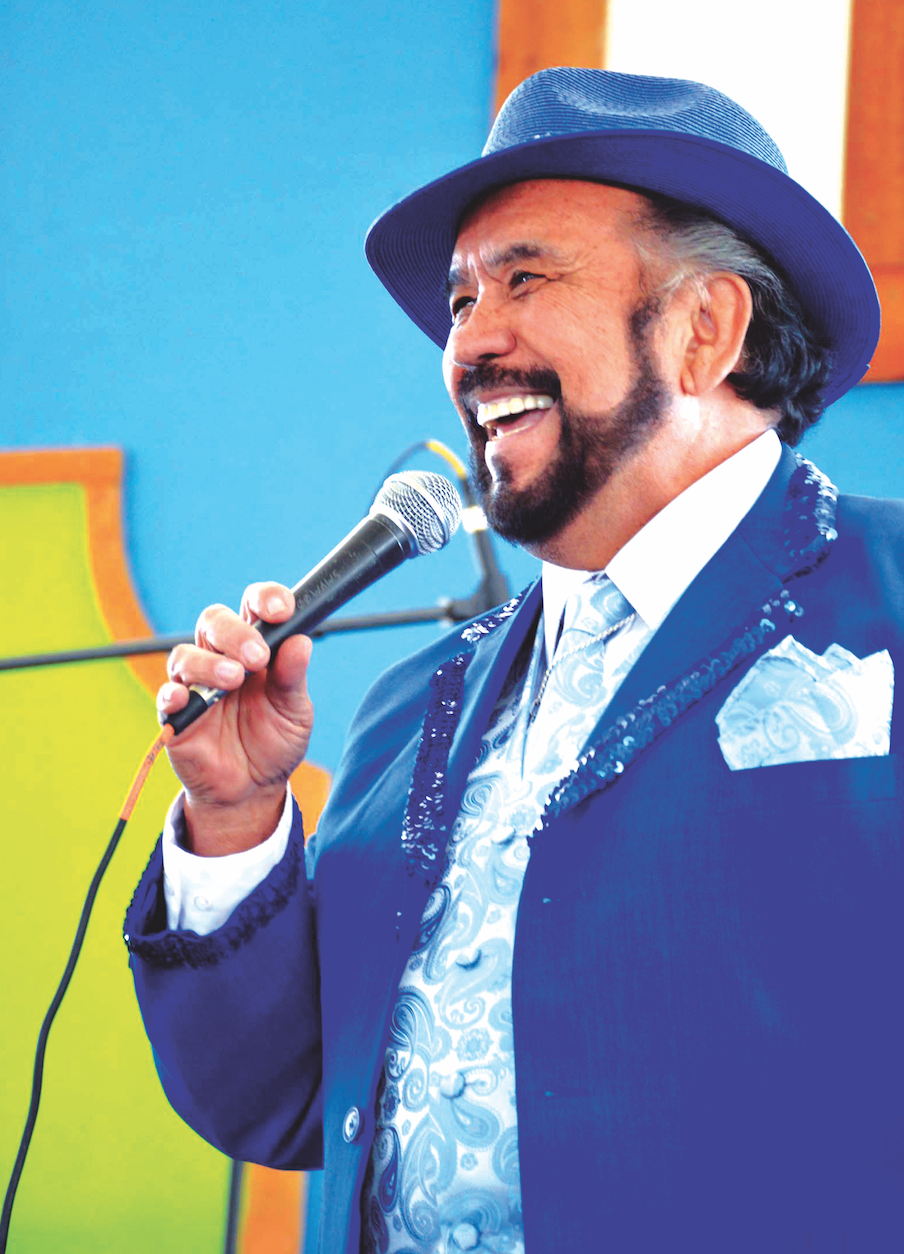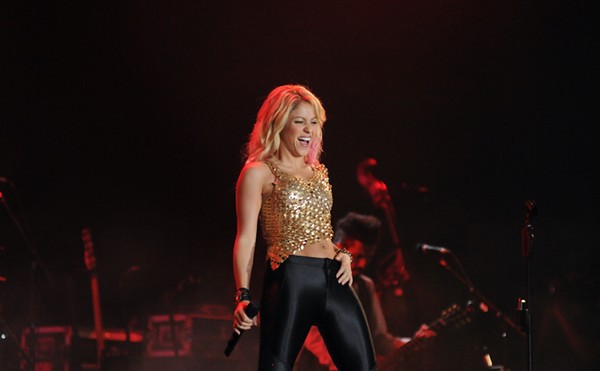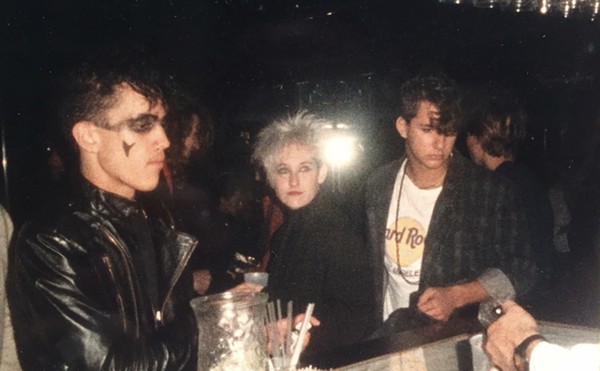The Legacy of Sunny & The Sunliners and Their Contribution to American Music
By Chris Conde on Tue, Oct 31, 2017 at 12:30 pm
Page 3 of 3
Release show or not, the Current caught up with Ozuna this September to talk about his role in the Chicano Soul movement and his recent deal with Big Crown.
The Current: Tell me about what was it like being a part of the whole West Side Sound movement? How did Chicano Soul and your group develop?
Sunny Ozuna: Well, it was kind of strange, ya’ know? I got into the music thing when I was still in high school and we used to have these dances on Wednesday nights at the Tom Heights Recreation Center on the Southside and the music was getting more into my blood. So when we wanted to started playing The West Side Sound kind of just came into its own … We were almost getting to the level of having already gone through the recording studios and “Talk To Me” came along, and things were starting to roll, and then they decided they wanted to call that [era] from where we started “West Side Sound.” I’m from the South Side, to be truthful, but the idea of the music where we used to play in the beginning like Patio Andaluz, and the old VFW out on the West Side, and little places like that that were on the westside of town, and so they just related the whole sound to the West Side … We were amazingly [popular] with the teenagers … and so our audiences were growing through that time. The music was growing, the groups were developing, the airplay was starting to happen, the kids were getting hooked, I mean, we couldn’t seem to do anything wrong, because we were all teenagers and just guessing [what to do next].
C: It’s really cool to hear how this all just happened organically. Like obviously, the general goal for any young musician starting out is to say, “Hey I wanna make money playing music, hang out with my friends and continue to do it as long as I possibly can,” and y’all really seemed to do that.
SO: And it was so much fun! To be truthful, the money didn’t become important [for] like the next four or five years. As teenagers were just anxious to get from one [gig] to the other, ‘cause all our friends from school were gonna be [at our gigs], all our fans were gonna be there, and we were anxious to just get up and play. We were young. Money wasn’t the reason we were doing it in the beginning. Until it became a business and the word “bills” came along (laughs).
(Laughs) What’s something that a lot of people don’t know about you and your band?
Well, I don’t know if people don’t know this but we got [involved] with lowriders. Back then, the car clubs wound up being a huge thing here in San Antonio, and they were having the dances all the time. If we were going to do La Villita downtown for the Gear Grinders, they would tell all the other car clubs in the city from miles around that they were gonna have [a dance] and [the other car clubs] would help them sell tickets. Then two weeks later, The Cruisers would have [a dance], and they would put out the word, then everybody [the other car clubs] would put out the word and so you can imagine this thing was just [growing and growing].
C: You guys were really innovative with your sound, introducing horns, etc., were you annoyed or flattered by other groups imitating some of the stuff y’all were doing?
SO: I think we were too lost in the good feelings … After a while, they copied the way we play, the way we dress, the equipment that we were using, the new lighting that no one had seen before. We had as many musicians and people in the industry in these crowds just to see what we were gonna do next. We found a tailor that would do all our suits – Dukes Tailor Shop in Houston. And every time we went there, we took the new up-and-coming designs out of Gentlemen’s Quarterly magazine (GQ) and we would run it up to Dukes. And we stayed ahead of everybody … and we did the same thing with our music. Once I got the wind of songwriting, which I never thought I was gonna like as much – I’m still doing it today – what happened was, once I did “Smile Now Cry Later” and “Just a Moment,” “Golly Gee,” and “The One Who’s Hurting Is You” and I said ‘You know what? This must be a way of life for me, this is so easy.’ And the songs were all fires, different sizes naturally. The huge one in R&B was “Talk To Me” but not missing it by much was “Smile Now Cry Later” and “Put Me In Jail” and the list goes on. But what I finally realized is that songwriting, if I could come up with one large fire (song), I was pretty much done for that year, ‘cause that was gonna keep us busy with teenagers wanting to come hear the new song. And then, of course, we were doing the same thing to the clothing, the equipment … For us, [this has] always been a full time job.
C: Speaking of songwriting, how many albums have you actually written?
SO: Around 69. Well, I didn’t write all of them, and the idea, even for day one, was that we were going to be a cover band. And we were listening to the radio and loving everything that the kids were loving and listening to Top 40. Then, of course, we had a Spanish radio station that was on fire for the kids, for the Hispanics here in San Antonio called KUKA back in the day. And so between those two, it was easy for us to write. For each of our CDs, what happened is that if we included a few [cover songs] and gave it our flavor, that would help the sales and they were ready to listen to whatever new original was [on the album]. Because they won’t come straight to the original stuff, it would have to grow on them from hearing it over and over on the radio then your “Smile Now Cry Later” would grow. And your “Put Me In Jail” would grow. But to answer your question, I included [songs] that I thought I could cover and give it a little bit of what I was doing it. But that’s when we included our originals. As we went through the years, we would add more and more originals because we could, once we started to become established.
C: How do you feel about hooking up your new label Big Crown Records?
SO: He [Akalepse] is going to [get] us into markets that we have never traveled or performed. He’s coming from up north and that is virgin territory because we never got out that far … Some of those places we didn’t get to reach – Philadelphia, because of American Bandstand, was about the only exception, but we didn’t do New York, New Jersey, nothing all the way across the top [of the U.S.]. Most of our business has been from the level of New Mexico, Colorado … the last 53 years. [Big Crown] is going to be [treating me] like a brand new artist and they don’t mind going that route since it’s actually helping what they’re trying to create. And so, it’s one more generation that we’ll be able to reach.
The Current: Tell me about what was it like being a part of the whole West Side Sound movement? How did Chicano Soul and your group develop?
Sunny Ozuna: Well, it was kind of strange, ya’ know? I got into the music thing when I was still in high school and we used to have these dances on Wednesday nights at the Tom Heights Recreation Center on the Southside and the music was getting more into my blood. So when we wanted to started playing The West Side Sound kind of just came into its own … We were almost getting to the level of having already gone through the recording studios and “Talk To Me” came along, and things were starting to roll, and then they decided they wanted to call that [era] from where we started “West Side Sound.” I’m from the South Side, to be truthful, but the idea of the music where we used to play in the beginning like Patio Andaluz, and the old VFW out on the West Side, and little places like that that were on the westside of town, and so they just related the whole sound to the West Side … We were amazingly [popular] with the teenagers … and so our audiences were growing through that time. The music was growing, the groups were developing, the airplay was starting to happen, the kids were getting hooked, I mean, we couldn’t seem to do anything wrong, because we were all teenagers and just guessing [what to do next].
C: It’s really cool to hear how this all just happened organically. Like obviously, the general goal for any young musician starting out is to say, “Hey I wanna make money playing music, hang out with my friends and continue to do it as long as I possibly can,” and y’all really seemed to do that.
SO: And it was so much fun! To be truthful, the money didn’t become important [for] like the next four or five years. As teenagers were just anxious to get from one [gig] to the other, ‘cause all our friends from school were gonna be [at our gigs], all our fans were gonna be there, and we were anxious to just get up and play. We were young. Money wasn’t the reason we were doing it in the beginning. Until it became a business and the word “bills” came along (laughs).
(Laughs) What’s something that a lot of people don’t know about you and your band?
Well, I don’t know if people don’t know this but we got [involved] with lowriders. Back then, the car clubs wound up being a huge thing here in San Antonio, and they were having the dances all the time. If we were going to do La Villita downtown for the Gear Grinders, they would tell all the other car clubs in the city from miles around that they were gonna have [a dance] and [the other car clubs] would help them sell tickets. Then two weeks later, The Cruisers would have [a dance], and they would put out the word, then everybody [the other car clubs] would put out the word and so you can imagine this thing was just [growing and growing].
C: You guys were really innovative with your sound, introducing horns, etc., were you annoyed or flattered by other groups imitating some of the stuff y’all were doing?
SO: I think we were too lost in the good feelings … After a while, they copied the way we play, the way we dress, the equipment that we were using, the new lighting that no one had seen before. We had as many musicians and people in the industry in these crowds just to see what we were gonna do next. We found a tailor that would do all our suits – Dukes Tailor Shop in Houston. And every time we went there, we took the new up-and-coming designs out of Gentlemen’s Quarterly magazine (GQ) and we would run it up to Dukes. And we stayed ahead of everybody … and we did the same thing with our music. Once I got the wind of songwriting, which I never thought I was gonna like as much – I’m still doing it today – what happened was, once I did “Smile Now Cry Later” and “Just a Moment,” “Golly Gee,” and “The One Who’s Hurting Is You” and I said ‘You know what? This must be a way of life for me, this is so easy.’ And the songs were all fires, different sizes naturally. The huge one in R&B was “Talk To Me” but not missing it by much was “Smile Now Cry Later” and “Put Me In Jail” and the list goes on. But what I finally realized is that songwriting, if I could come up with one large fire (song), I was pretty much done for that year, ‘cause that was gonna keep us busy with teenagers wanting to come hear the new song. And then, of course, we were doing the same thing to the clothing, the equipment … For us, [this has] always been a full time job.
C: Speaking of songwriting, how many albums have you actually written?
SO: Around 69. Well, I didn’t write all of them, and the idea, even for day one, was that we were going to be a cover band. And we were listening to the radio and loving everything that the kids were loving and listening to Top 40. Then, of course, we had a Spanish radio station that was on fire for the kids, for the Hispanics here in San Antonio called KUKA back in the day. And so between those two, it was easy for us to write. For each of our CDs, what happened is that if we included a few [cover songs] and gave it our flavor, that would help the sales and they were ready to listen to whatever new original was [on the album]. Because they won’t come straight to the original stuff, it would have to grow on them from hearing it over and over on the radio then your “Smile Now Cry Later” would grow. And your “Put Me In Jail” would grow. But to answer your question, I included [songs] that I thought I could cover and give it a little bit of what I was doing it. But that’s when we included our originals. As we went through the years, we would add more and more originals because we could, once we started to become established.
C: How do you feel about hooking up your new label Big Crown Records?
SO: He [Akalepse] is going to [get] us into markets that we have never traveled or performed. He’s coming from up north and that is virgin territory because we never got out that far … Some of those places we didn’t get to reach – Philadelphia, because of American Bandstand, was about the only exception, but we didn’t do New York, New Jersey, nothing all the way across the top [of the U.S.]. Most of our business has been from the level of New Mexico, Colorado … the last 53 years. [Big Crown] is going to be [treating me] like a brand new artist and they don’t mind going that route since it’s actually helping what they’re trying to create. And so, it’s one more generation that we’ll be able to reach.

KEEP SA CURRENT!
Since 1986, the SA Current has served as the free, independent voice of San Antonio, and we want to keep it that way.
Becoming an SA Current Supporter for as little as $5 a month allows us to continue offering readers access to our coverage of local news, food, nightlife, events, and culture with no paywalls.
Scroll to read more Music Stories & Interviews articles
Newsletters
Join SA Current Newsletters
Subscribe now to get the latest news delivered right to your inbox.
















